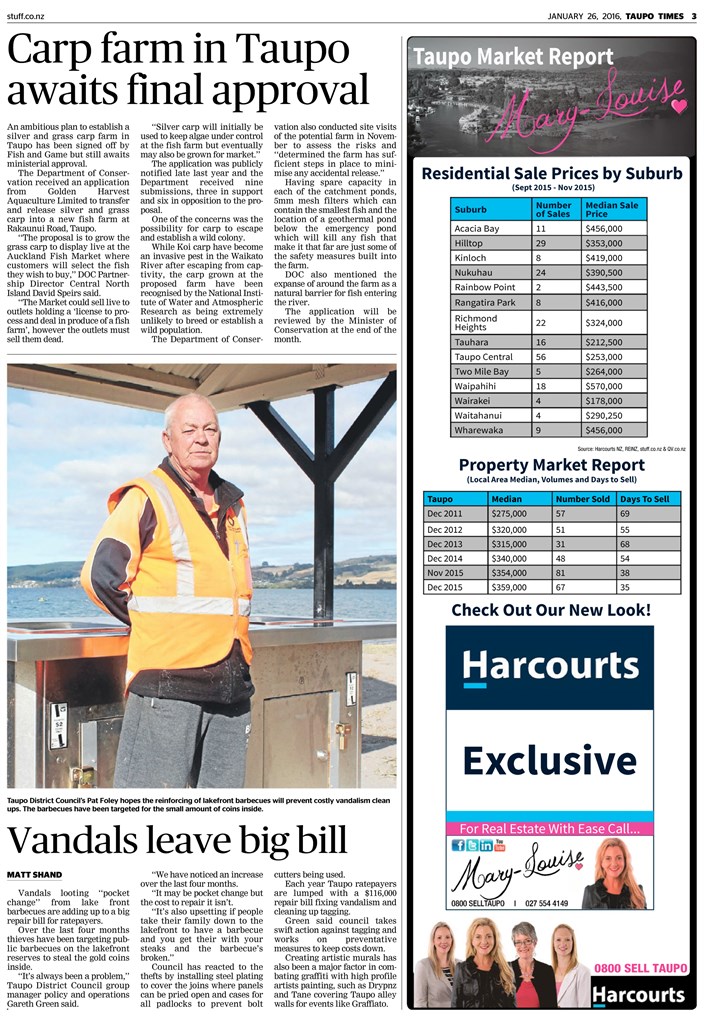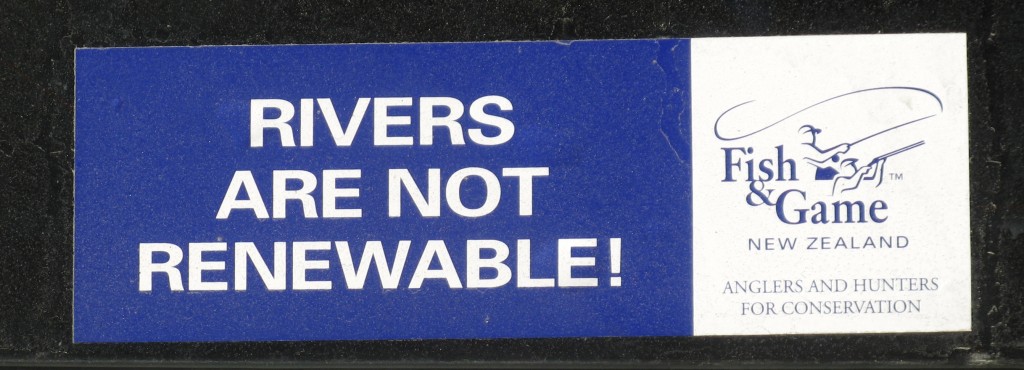2015 – DOC approve a trout farm in Turangi?
2016 – DOC approve a carp farm in Taupo?
2017 – ??? NZ should be safe from such stupid decisions – isn’t it election year?
An angling group is urging the Conservation Minister to say no to a proposed grass and silver carp farm near Lake Taupo for fear they will escape and destroy the lake.
But the group behind the proposal says there’s no danger.
One-hundred-thousand fish could soon be swimming in ponds, with 1 tonne a week to be shipped to Auckland restaurants.
But opponents like the Federation of Fresh Water Anglers and the Outdoors Party say the silver and grass carp are invasive.
“Countries all around the world now are spending a fortune, vast amounts of money, trying to exterminate the silver carp, and here we are trying to release them right next to the most beautiful lake in New Zealand, in fact in the South Pacific,” says Alan Simmons, from the New Zealand Outdoor Party.
The site is 6km from Lake Taupo, 2.5km from the Waikato River, and its proponents say there’ll be no discharge from the ponds.
“No matter what happens and wherever these fish have been released before there have been all the assurances in the world and they’ve still escaped, whether a human carries it or maybe a bird carries it. It will happen,” says Mr Simmons.
But those behind the proposal say the lakes and rivers are too cold and the rivers aren’t long and fast enough.
“It’s a still body of water, so there’s no water flow, so there’s virtually no chance they’ll be able to establish a population,” says Richard Clark from Golden Harvest Aquaculture.
In the United States there is a huge problem with silver carp leaping from rivers.
Even though they grow up to 40kg, they’re easier to shoot than hook because they only eat plankton.
Mr Clark says Conservation Minister Maggie Barry gave permission to transfer and release the carp yesterday with special conditions, but he’s still waiting for a fish farm licence.
3 News
“In nature, there are neither rewards or punishments; there are consequences”. Robert Greene Ingersoll – 1881
All TRM inmates continue to question these terrible short sighted decisions? You decide!.
TRM correspondents emails oppose both. i.e. Following letter from a concerned angler:
Silver Carp are just the latest in a long line of crackpot ‘get rich quick’ schemes involving freshwater aquaculture with the potential to decimate our freshwater recreational fisheries. The Federation wasn’t around when Brown Bullhead were imported, but it has successfully opposed Channel Catfish and Marron Crayfish, as well as trout farming.
They lost the case for Grass Carp despite opposing it, because the bastards originally required such fish to be triploid (ie sterile) which they accepted. Now they are breeding them – there is a lesson in there we should take heed of!
And in the case of Channel Catfish, they had imported them and were breeding them up at Silverstream in the Hutt – and F&G were nowhere to be seen. The then Fisheries Minister (Colin Moyle) was determined to see it through and it took a concerted media and letter writing campaign, us camping on the doors of several ministers, and a Cabinet reshuffle to stop it.
The only safe way to stop these things is to make sure they don’t start.
History would suggest that anything else is going to fail. Saying you are not allowed to breed them or liberate them has done a wonderful job with Red Eared Slider turtles, hasn’t it? The dam things are breeding in Lake Taupo (and who knows where else) and wandering wild all over the roads in Horowhenua.
We just don’t learn, do we?
Another anglers asks: Instead of breeding carp, why doesn’t DOC encourage them to net Lake Taupo for catfish? Then everyone benefits…
Fish & Game’s response to trout farm proposal
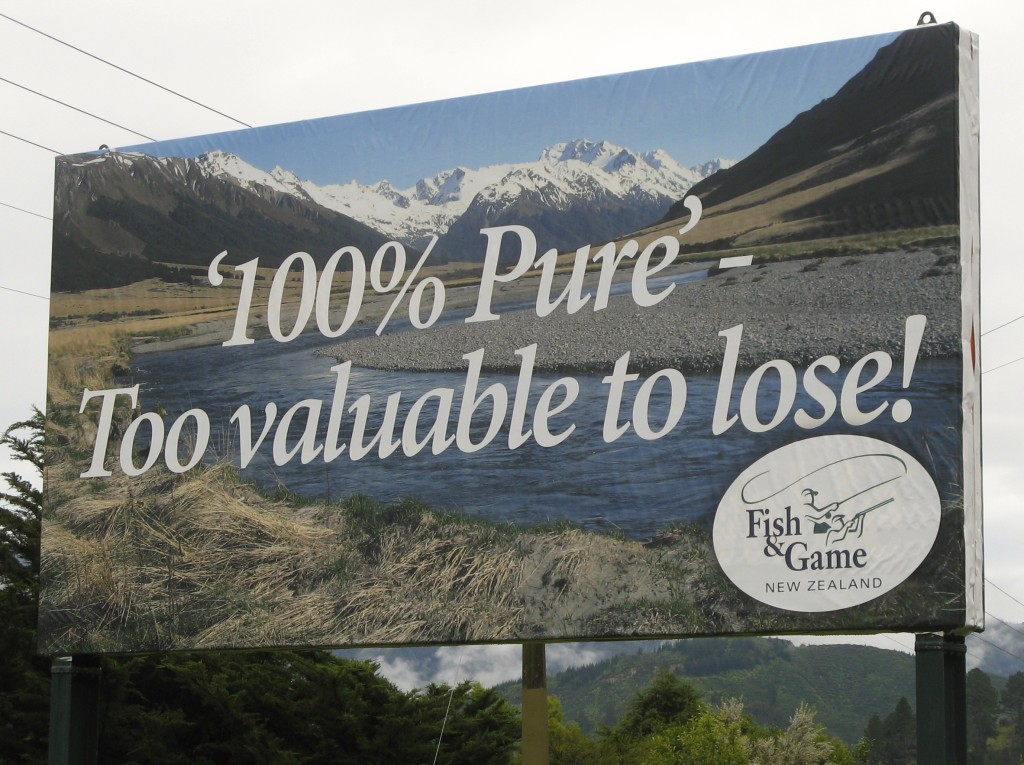 Fish & Game’s response to trout farm proposal –
Fish & Game’s response to trout farm proposal –
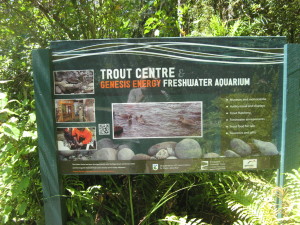 This contentious issue is the proposal by the Crown to convert the trout centre at Turangi into a trout farm exclusively to supply local maori.
This contentious issue is the proposal by the Crown to convert the trout centre at Turangi into a trout farm exclusively to supply local maori.
Tongariro River Motel anglers unanimously oppose the proposal and wish to thank and support Fish & Game for their strong statement.
It is now over three months since the first leak of the Crown (aka Department of Conservation) proposed deal with Tuwharetoa (local maori tribe) was published.
 Tongariro anglers are still waiting patiently but all attempts requesting an explanatory statement from DOC – supposedly the managers (?) of the Taupo Fishery – have been unsuccessful. All concerned anglers have been referred to the OTS (Office of Treaty Settlements).
Tongariro anglers are still waiting patiently but all attempts requesting an explanatory statement from DOC – supposedly the managers (?) of the Taupo Fishery – have been unsuccessful. All concerned anglers have been referred to the OTS (Office of Treaty Settlements).
As such, DOC no longer qualify nor deserve the title of ‘managers’.
It is time for Fish & Game to take over the management of the Taupo Fishery.
Fish & Game’s statement follows:
Fish & Game vows ‘strong opposition’ to trout farming proposals
 Fish & Game has confirmed its strong opposition to commercial trout farming following revelations of a Bay of Plenty Regional Growth Study promoting, among other initiatives, the development of a commercial trout industry.
Fish & Game has confirmed its strong opposition to commercial trout farming following revelations of a Bay of Plenty Regional Growth Study promoting, among other initiatives, the development of a commercial trout industry.
The study, which was undertaken to identify economic opportunities within the region, was commissioned by the Ministries of Business, Innovation and Employment (MBIE) and Primary Industries (MPI) in partnership with the Bay of Connections.
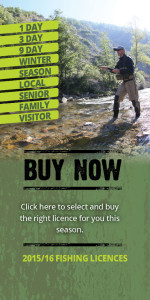 Trout farming has been identified as a ‘key priority for regional development’ after the launch of the study, and the formulation of an action plan endorsed at a workshop involving more than 120 regional leaders and stakeholders.
Trout farming has been identified as a ‘key priority for regional development’ after the launch of the study, and the formulation of an action plan endorsed at a workshop involving more than 120 regional leaders and stakeholders.
Fish & Game Eastern Region Manager Andy Garrick says that as the primary statutory manager and guardian of trout in New Zealand waters, Fish & Game is “utterly staggered” to have not been consulted or invited to participate in the development of the strategy and more recent implementation planning.
To hear about the plan through the media is very disturbing, especially when the idea comes from a partnership involving local, regional and central government who should be aware of the law as it stands – which explicitly bans trout farming. They should be upholding the law, not being dismissive of it, Mr Garrick says.
“The Conservation Act specifically prohibits the buying and selling of trout and domestic farming of the fish.”
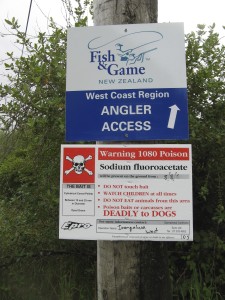 Mr Garrick says that if the proposals are taken further, Fish & Game will vigorously oppose them alongside sports fishing organisations “and a large number of New Zealanders who are passionate about trout fishing who’ve repeatedly expressed their opposition to trout farming.”
Mr Garrick says that if the proposals are taken further, Fish & Game will vigorously oppose them alongside sports fishing organisations “and a large number of New Zealanders who are passionate about trout fishing who’ve repeatedly expressed their opposition to trout farming.”
Fish & Game’s position is based on a number of key concerns, Mr Garrick says.
“A key issue centres on poaching – we believe that the setting up of a legitimate commercial market for trout would inevitably result in a black market like that for paua.
“Trout poaching during the spawning season has long been an issue within the Bay of Plenty and Taupo regions.
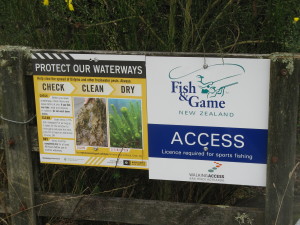 “It not only removes adults and breeding stock, but can cause extensive damage to spawning habitat, eggs and juvenile fish which in turn, can seriously impact on fish populations and opportunities for law-abiding anglers.
“It not only removes adults and breeding stock, but can cause extensive damage to spawning habitat, eggs and juvenile fish which in turn, can seriously impact on fish populations and opportunities for law-abiding anglers.
“It also harms local businesses and communities which depend on the millions of dollars trout angling and tourism generates for these regions,” Mr Garrick said.
Any trout farming would be highly likely to lead to an increase in both poaching and habitat damage, he adds, so that anti-poaching efforts would have to be stepped up.
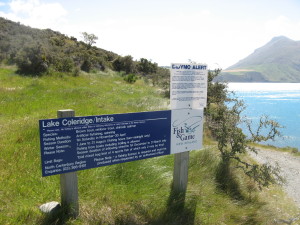 “They are currently funded entirely from Fish & Game licenceholder income as Fish & Game receives no revenue or support from local or central government.
“They are currently funded entirely from Fish & Game licenceholder income as Fish & Game receives no revenue or support from local or central government.
“This would impact on the organisation’s ability to deliver other critical species and habitat management programmes.”
Mr Garrick says that other biosecurity-type concerns relate to the risk of disease being introduced to wild populations which while not high, remains a risk.
Another potential issue is the genetic impact on wild fish that might occur if breeding stock was imported to enhance growth rates and flesh quality.
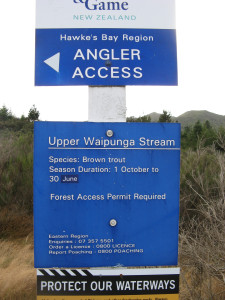 Last but far from least there are cultural, recreational, tourism and economic values to consider, he says.
Last but far from least there are cultural, recreational, tourism and economic values to consider, he says.
“ New Zealand’s internationally acclaimed wild trout fishery was established and nurtured for more than a century, not by local or central government, but through the voluntary efforts and financial support of anglers, and various organisations representing their interests.”
And Fish & Game hatcheries have spent more than 50 years producing the best breeding stock possible to release throughout the country’s lakes, he says.
“If anyone can claim a property right to New Zealand’s trout fishery it would be the anglers of this country who’ve made it quite clear on numerous occasions that they don’t want commercial trout farming.
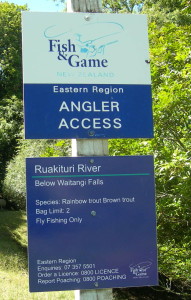 “Over 100,000 anglers annually fish for trout in New Zealand and they are passionate about their sport and the opportunity to harvest free range trout for the table.”
“Over 100,000 anglers annually fish for trout in New Zealand and they are passionate about their sport and the opportunity to harvest free range trout for the table.”
Mr Garrick says the economic contribution trout fishing makes to the regional economy in the Rotorua Lakes area alone was estimated to be over $17m 25 years ago – a figure which is likely to have risen significantly.
An investigation of the economic value of the Taupo fishery indicated that it injected $29m into the economy in 2012.
“Why would you want to jeopardise this revenue by allowing commercial trout farming?”
“While the Regional Growth Study makes bold claims about the contribution commercial trout farming along with other initiatives could make to the regional aquaculture target of $250m sales by
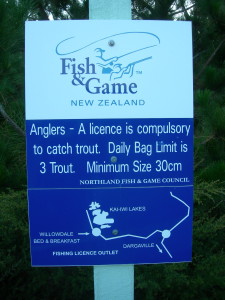 2025, and the national target of $1billion, it doesn’t appear there have been any investigations into its financial viability, or reports produced to support the figures.
2025, and the national target of $1billion, it doesn’t appear there have been any investigations into its financial viability, or reports produced to support the figures.
“Furthermore, there has been no assessment of the potential impact on wild trout populations, the fishery, or its management, let alone the environment.
“There are many sound reasons to support the ongoing ban on commercial trout farming. commonsense prevails and that everyone can avoid a lengthy and bitter legal battle.”
FURTHER INFORMATION:
Fish & Game North Island Communications Advisor Grant Dyson 021-646 267
WHAT/WHO IS FISH & GAME?
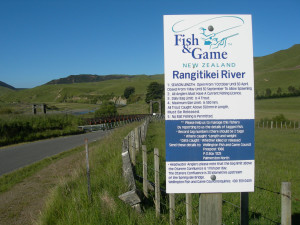 Fish & Game is a statutory public entity, established by Parliament under the Conservation Act, to manage, maintain and enhance sports fish and gamebirds, and their habitats. It is not a lobby group but an organisation with specific responsibilities under Acts of Parliament, including the Conservation, Resource Management, Walking Access, Public Finance and Overseas Investment Acts.
Fish & Game is a statutory public entity, established by Parliament under the Conservation Act, to manage, maintain and enhance sports fish and gamebirds, and their habitats. It is not a lobby group but an organisation with specific responsibilities under Acts of Parliament, including the Conservation, Resource Management, Walking Access, Public Finance and Overseas Investment Acts.
The New Zealand Fish & Game Council represents the interests of anglers and gamebird hunters nationally. The Council and the 12 regional Fish & Game councils are collectively known as Fish & Game New Zealand. Fish & Game receives no money from the government. All funding is provided by freshwater anglers and gamebird hunters – a “user pays, user says” tradition dating back 150 years.
Finally just to prove how dangerous carp can be…
http://fox2now.com/2015/08/31/pleasant-hill-man-injured-by-flying-asian-carp/
Pleasant Hill man injured by flying Asian carp
ST. LOUIS (KTVI) – For the past few weeks, Jordan Fiedler, 19, has been making a four hour round trip to St. Louis University Hospital from Pleasant Hill, Illinois, just to save face.
His face.
‘I knew something was wrong,’ Fiedler said. ‘I felt my nose and it was way over here.’
On August 8th, Fiedler, who lives about two hours north of St. Louis, was on a family outing at a shallow channel along the Mississippi.
But while inner tubing down the river chute, Asian Carp began flying out of the water.
‘I put my head down and the one time I lifted my head up and came and hit me straight in the face,’ Fiedler said.
His family was with him when it happened. His father was driving the boat and his mother was watching from a sandbar.
‘When I got in the boat it was panic because I didn`t understand what was going on and then for the amount of blood lost it was quite scary,’ said Jordan`s mother, Robin Fiedler.
That direct hit fractured Jordan`s nose and dented his forehead, shattering the bones above his brow and in both eye sockets.
Asian Carp are an invasive species that jump above the water line when they are startled or scared, and the results in Jordan`s case could have been life threatening.
‘If it had hit me any harder it could have broken my skull bones and essentially damaged my brain and killed me on the spot,’ he said.
His plastic surgeon, SLUCare Dr. Bruce Kraemer, confirms that scenario.
The surgery to repair Jordan`s face took three and a half hours, and involved a piece of mesh and screws to restore the shape of his forehead.
Despite all the damage, Jordan`s prognosis is good. Once the swelling goes down in another 3 to 4 weeks, he may have a hard time convincing people his fish tale is true.

